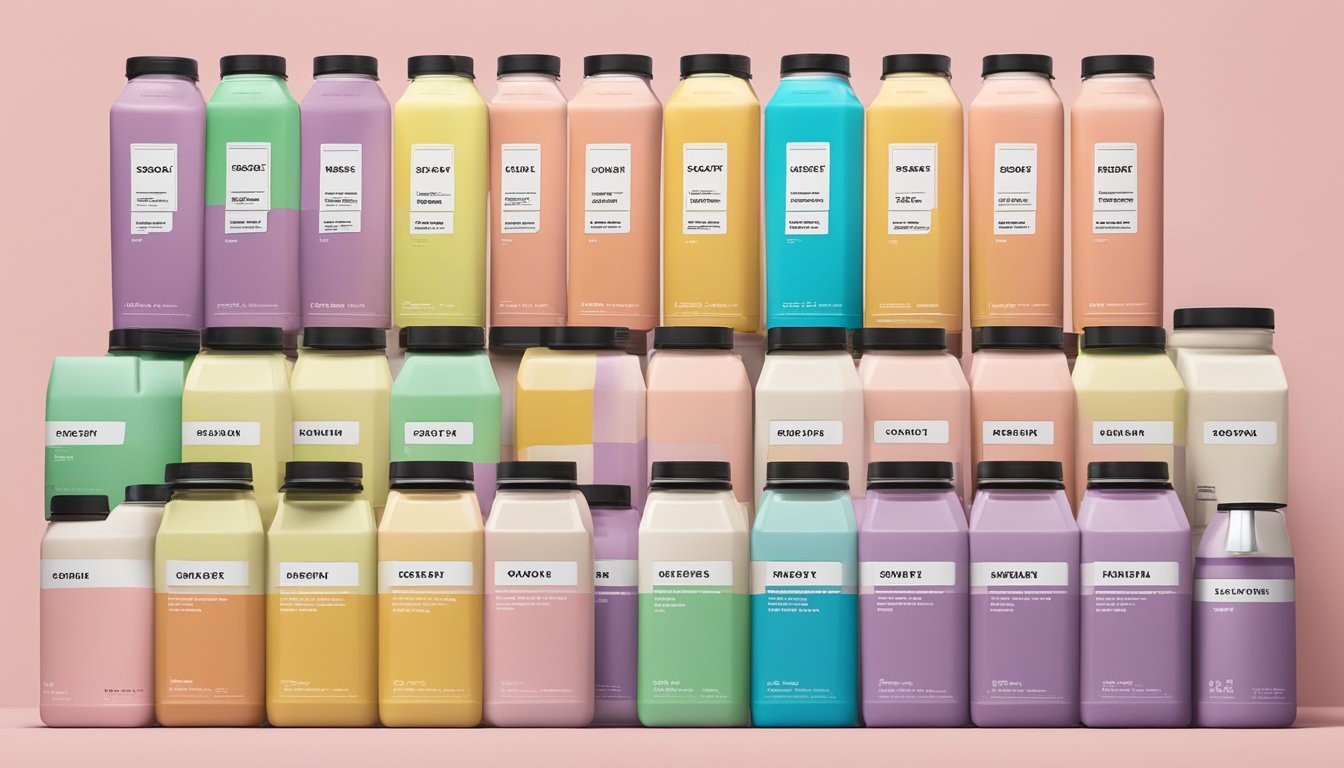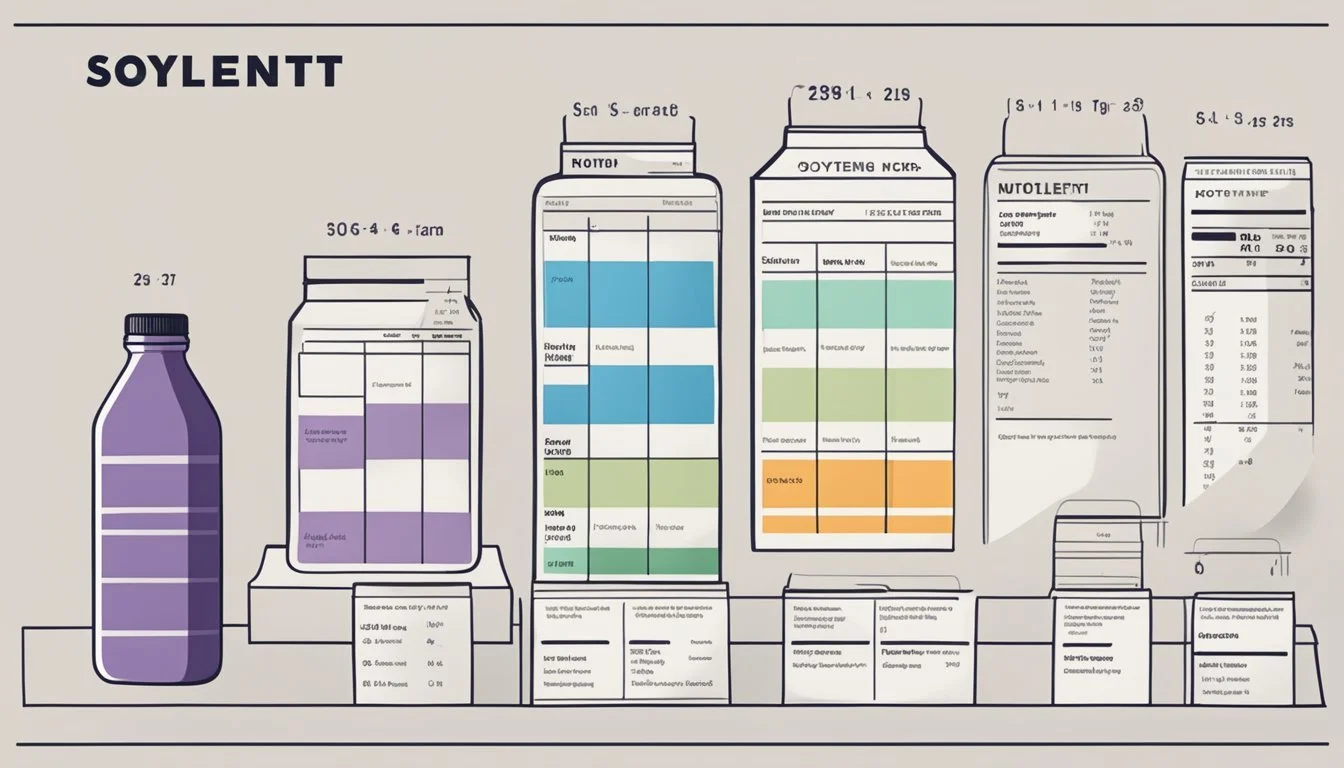How Many Servings of Soylent Meal Replacement Is Too Much?
Understand Your Limits
With the rising popularity of meal replacements like Soylent, many are left wondering about the optimal consumption level. Soylent promises balanced nutrition and convenience, making it a go-to option for busy individuals.
Consuming more than three servings of Soylent meal replacement per day can lead to an unbalanced diet. Despite its nutritional composition, relying heavily on Soylent could mean missing out on the dietary variety presented by whole foods.
Soylent includes essential nutrients such as protein, fats, carbohydrates, and micronutrients, designed to mirror a healthy meal's nutritional profile. Incorporating Soylent into your diet can be beneficial, but moderation and a balanced intake of whole foods are crucial.
Understanding Soylent Meal Replacement
Soylent meal replacements are designed to provide complete nutrition in a convenient form. They offer a blend of macronutrients and micronutrients to support overall health.
Composition of Soylent
Soylent contains a mix of protein, carbohydrates, fiber, fat, vitamins, and minerals. The primary protein source is soy protein isolate, a complete protein suitable for vegetarians and vegans. Each serving provides approximately 20 grams of protein.
Carbohydrates in Soylent come primarily from maltodextrin and isomaltulose, offering a sustained energy release. Soluble fiber derived from isomaltulose and oat fiber supports digestive health. Fat sources include high oleic sunflower oil and canola oil, which provide essential fatty acids.
In terms of micronutrients, Soylent includes a blend of 28 vitamins and minerals to meet daily nutritional needs. Each serving delivers around 400 calories, which can serve as a substantial meal replacement.
Types of Soylent Products
Soylent offers various formats to suit different preferences and needs. The primary products include Soylent Drink, Soylent Powder, and Soylent Squared.
Soylent Drink is ready-to-drink and available in multiple flavors. It offers convenience for on-the-go nutrition, with each bottle containing 400 calories and a balanced nutritional profile.
Soylent Powder requires mixing with water and provides flexibility in preparation. It is ideal for those who prefer customizing their meal replacement shakes. Each serving maintains the standard nutritional components, allowing users to tailor their intake.
Soylent Squared is a smaller, snack-sized option. Each square provides 100 calories and is designed for lighter consumption between meals.
Soylent products cater to various dietary needs and preferences, making them a versatile choice for meal replacement.
Nutritional Profile
Soylent meal replacements offer a convenient way to meet daily nutritional needs, providing both macronutrients and essential micronutrients. Their carefully calculated composition supports balanced nutrition but must be consumed with awareness of serving limits.
Macronutrients in Soylent
Soylent drinks deliver a balanced distribution of macronutrients. Each serving contains approximately 20 grams of protein, which is crucial for muscle maintenance and repair. For a typical 2000-calorie diet, this amount represents 40% of the daily value.
In terms of carbohydrates, Soylent provides about 37 grams per serving. These carbs come from sources like maltodextrin and isomaltulose, which provide quick and sustained energy.
Fat is another significant component, with each serving containing around 9 grams. This includes essential fatty acids like omega-3 and omega-6, which play key roles in brain health and inflammation reduction.
Micronutrients and Added Sugars
Soylent is fortified with 28 vitamins and minerals, making it a robust source of micronutrients. Each serving delivers 100% of the daily value for essential vitamins such as B12, niacin, and riboflavin, which are crucial for energy production and metabolic processes.
Minerals like iron, calcium, and potassium are also adequately represented, contributing to overall body function and health. While Soylent is designed to be low in added sugars, consumers should still check labels, as some variations might contain minimal amounts to enhance flavor.
The combination of vitamins and minerals ensures that each serving supports immune function, bone health, and cognitive performance. This comprehensive nutrient profile is designed to complement a balanced diet without the excess of unwanted sugars.
Health Considerations
Soylent meal replacements can offer convenience and nutrition, but there are some key factors to consider regarding your health. It's essential to integrate Soylent wisely into a balanced diet and be mindful of potential health risks.
Balanced Diet Integration
When incorporating Soylent into a daily routine, balance is fundamental. Soylent provides nutrients such as vitamins, minerals, and protein that are crucial for daily consumption.
However, relying exclusively on Soylent without consuming traditional meals could lead to an imbalance. Whole foods contain beneficial compounds like fiber, antioxidants, and other phytonutrients that cannot be fully replicated in a meal replacement shake. Occasional meals involving fresh fruits and vegetables should still be part of the diet for these additional benefits.
Additionally, over-dependence on Soylent could result in missing out on the variety that a balanced meal usually provides. Each component of a meal, from grains to proteins to fats, plays a unique role in maintaining overall health.
Potential Health Implications
Consuming Soylent in moderation can be part of a healthy diet, but excessive intake might pose certain risks. Soylent, while rich in nutrients, often includes saturated fat and trans fat, which, if consumed in large quantities, could contribute to heart disease.
Healthy fats like omega-3 and omega-6 fatty acids are essential for good heart health. Many people do not have a balanced intake of these fats, and Soylent might not perfectly balance these needs. Watching the ratio of high-quality fats in Soylent compared to whole foods is crucial for maintaining heart health.
Furthermore, high dependence on meal replacements can sometimes lead to unintended weight loss or gain. While Soylent can aid in weight management when used thoughtfully, it requires careful monitoring to ensure that caloric intake matches individual energy needs.
In sum, while Soylent meal replacements offer convenience and essential nutrients, a balanced approach integrating whole foods remains vital to avoid potential health implications.
Consumption Guidelines
Determining the right amount of Soylent to consume involves considering nutritional needs and recognizing signs of overconsumption.
Recommended Serving Size
Soylent is designed as a meal replacement that provides comprehensive nutrition. Each serving of Soylent varies between products, such as ready-made drinks or meal replacement powders.
A typical drink serving offers 20 grams of protein and 400 calories. The nutrition facts panel indicates that it contains essential vitamins and minerals, including B vitamins, which aid in metabolism.
Dietitians recommend that Soylent should complement other food sources rather than replace every meal. Caloric intake should align with one’s daily energy requirements, which generally range from 1,800 to 2,400 calories for most adults.
Identifying Overconsumption
Overeating Soylent can occur if the calorie intake from Soylent surpasses an individual's energy needs. Signs of overconsumption include unwanted weight gain and possible nutrient imbalances.
Additionally, consuming multiple servings without monitoring the total caloric intake may lead to excessive intake of certain nutrients, which can have adverse effects.
To avoid overconsumption, users should pay attention to the serving label, track their daily intake, and balance Soylent with traditional, whole-food meals.
Diverse Flavors and Options
Soylent meal replacements come in an array of flavors and specialized versions to cater to varying preferences and dietary needs. This provides consumers with flexibility in their meal replacement choices and additional benefits from different ingredients.
Flavor Varieties
Soylent offers a myriad of flavors designed to satisfy different taste preferences. These include Cacao, Chocolate, Vanilla, Strawberry, Chai, and Mint Chocolate. Each of these flavors aims to provide a palatable experience while also delivering balanced nutrition.
Cacao and Chocolate are popular among those who seek a richer, more indulgent taste whereas Vanilla tends to appeal to those who prefer a lighter, milkier flavor. Strawberry and Chai bring a fruitier and spicier dimension, respectively. Mint Chocolate offers a refreshing twist, especially appealing during warmer months.
Specialty Options
In addition to standard meal replacement drinks, Soylent provides specialty options catering to specific needs. These include Soylent Complete Energy, imbued with 100 milligrams of caffeine and L-theanine for an energy boost, as well as B vitamins like niacin, riboflavin, B6, B12, and pantothenic acid to support energy production in the body.
There’s also Soylent Complete Protein for those focusing on protein intake, featuring 20g of protein per serving along with essential amino acids. Furthermore, their plant-based formula ensures that the drinks remain inclusive for vegan consumers and those with certain allergies. This flexibility allows users to select options that align with their lifestyle and nutritional goals.
Comparative Analysis
Soylent offers distinct advantages and disadvantages when compared to other meal replacement brands. This section examines Soylent's efficiency, cost-effectiveness, and overall value.
Soylent Versus Other Brands
Soylent is often compared with other meal replacements like Huel, Ensure, SlimFast, and Orgain.
Huel and Soylent both provide balanced nutrition and are vegan-friendly. However, Huel offers a higher fiber content, which may aid digestion better for some individuals. Ensure, targeting older adults, includes additional vitamins beneficial for aging populations. SlimFast is marketed more towards weight loss, with lower calorie offerings. Orgain, known for its clean ingredients, offers organic options but may come at a higher price point. Soylent's pre-made shakes and 12-ounce servings provide convenience, but the lower 8-ounce options may not suffice as a complete meal replacement.
Cost-Effectiveness
Soylent pricing varies from $1.82 to $3.25 per serving. A two-scoop serving of Soylent Powder costs approximately $2.80.
This cost efficiency competes favorably with other brands. Huel's powder often ranges around $2 per serving, making it slightly cheaper. Ensure and SlimFast tend to be more expensive when considering daily usage. Orgain, particularly its organic protein powders, can also be pricier, reducing its overall affordability. Subscriptions can offer discounts, making Soylent more affordable for regular users. The value is significant when considering convenience and the nutritional profile provided per serving, making Soylent a competitive option in the meal replacement market.
Lifestyle and Convenience
Soylent meal replacements offer a practical solution for those with busy schedules, particularly benefiting individuals with active lifestyles and those seeking convenient, healthy food options. With their ready-to-drink format and simple preparation, they make nutritious meals accessible and easy.
Soylent for Active Lifestyles
Soylent drinks and powders cater to individuals with demanding schedules who seek efficient nutrition. For those who juggle work, exercise, and social commitments, carrying a Soylent meal replacement ensures they can maintain a balanced diet without compromising on time. Athletes and fitness enthusiasts may find Soylent beneficial due to its balanced nutrient profile, which includes essential vitamins and minerals necessary for muscle recovery and sustaining energy levels.
By providing a consistent and quick meal option, Soylent can help keep energy levels stable throughout the day, reducing the likelihood of turning to less nutritious, quick fixes. This makes it an ideal choice for engineers, students, busy professionals, and anyone needing to maximize time efficiency.
Accessibility and Availability
Accessibility and availability are significant advantages of Soylent products. They are widely available through various channels, ensuring that even those with the busiest schedules can easily incorporate them into their daily routine. Soylent offers a subscription service, allowing users to receive regular deliveries, reducing the hassle of frequent shopping trips.
Additionally, the product comes in multiple forms, including ready-to-drink bottles and powders that can be mixed quickly with water. This versatility ensures that people with different preferences and needs can find a suitable format. Such convenience makes Soylent a valuable option for those aiming to maintain a healthy diet, even with time constraints.
The practicality of Soylent’s design and distribution makes it a reliable meal replacement for anyone looking to seamlessly integrate balanced nutrition into their lifestyle.
Environmental and Ethical Considerations
Soylent promotes sustainability and ethical sourcing, focusing on eco-friendly practices and responsible ingredient procurement.
Sustainability
Soylent emphasizes the use of plant-based protein, specifically soy protein, which has notable benefits for the environment. Production of soybeans in the U.S. significantly reduced greenhouse gas emissions by 43% between 1980 and 2020. By reducing the dependency on animal proteins, Soylent aims to offer an environmentally friendly alternative to traditional diets.
The company is committed to creating products with a minimal ecological footprint. Meal replacement options like Soylent help to combat the environmental strain caused by traditional food systems, vital for addressing increased food production needs as the global population rises.
Ethical Sourcing
Soylent sources ingredients ethically, taking care to ensure that its vegan products meet high ethical standards. The use of genetically modified (GM) soy protein is a deliberate choice, aimed at increasing crop yields and reducing the need for pesticides, which can be crucial for sustainable farming practices.
Moreover, Soylent prioritizes fair labor practices and responsible farming. Ensuring that their ingredient providers adhere to strict ethical guidelines helps maintain the integrity of their supply chain. This commitment to ethics underscores Soylent's dedication to not only environmental responsibility but also to social accountability in food production.










